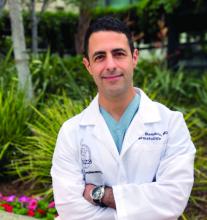Recently, a stiff-white-coat family medicine resident showed up eager for his first day in dermatology. Working with him reminded me how exciting the journey is from resident to attending. It also reminded me how slow residents are – we’re 10 minutes into a visit and not yet done injecting anesthesia. A simple biopsy and electrodesiccation of a basal cell carcinoma would take 3 minutes – easy, rote, like driving home and being surprised when you arrive. But this task is making my resident so fraught with fear he’s barely moving. He won’t be crawling for long; his journey from novice to confident physician will be quick. Like a student pilot learning to fly, in a few hundred hours he’ll be flying solo.
After a year, most residents are adept, exuding the temerity of an attending. But as any practicing physician knows, medicine can make cowards of us all without warning. An experienced pilot facing an unexpected gusty 25-knot crosswind landing can find himself or herself a trembling beginner just as an excellent clinician can be overwhelmed facing an unexpectedly sick patient.
Not long after my visiting resident, I was back to my own packed clinic. With one swoop of a dermablade, I intended to quickly extirpate a keratoacanthoma on the back of an elderly man’s hand. I hardly had to think about it. However, when I lifted the blade, dark blood pooled where a dorsal saphenous vein used to live. After much electrodesiccation (and sutures) this particular biopsy was safely landed. But it wasn’t without a bit of blood loss and inconvenience for the patient. What might I have done differently? Injected 5-fluorouracil instead? Done an incisional biopsy? Used a different blade? More importantly, what will I do next time?
To avoid adverse outcomes, it might seem like the best strategy is to avoid deteriorating conditions, whether flying or in clinic. That would be a mistake. The journey from apprehension to mastery must pass through discomfort. It is only by working through unease and successfully managing complications that expertise is forged. Our days are mostly routine and the longer the period without adversity, the greater the risk of complacency. Consider seeking difficulty once in awhile and learn how to work through it. No pilot wants to be in a situation he or she hasn’t practiced managing.
For some physicians and residents, an unexpected complication or adverse outcome can make them apprehensive and defensive. I’ve seen doctors choose not to treat complicated diseases or dire lesions because of a previous bad experience or adverse outcome. It is sometimes appropriate to transfer a patient to a different service, but as physicians, it’s also our job to take care of our patient. When it’s your plane, you’ll have to land it.
Much later (or so it seemed), my resident finally finished the electrodesiccation and curettage. He had a look of relief knowing he has landed safely. I hope he realizes that this is a trip that he must take over and over again. One is never done learning to fly.
Dr. Benabio is director of Healthcare Transformation and chief of dermatology at Kaiser Permanente San Diego. The opinions expressed in this column are his own and do not represent those of Kaiser Permanente. Dr. Benabio is @Dermdoc on Twitter. Write to him at dermnews@mdedge.com.

